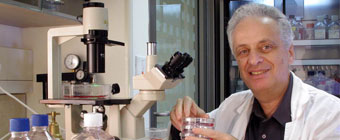Autoimmune Diseases
New Therapeutic Molecules for the treatment of Inflammatory Autoimmune Diseases and Cancer
Prof. Karin was the first to discover beneficial antibodies against pro-inflammatory chemokines and cytokines, and played a key role in the invention of therapeutic antibody natalizumab for treating multiple sclerosis and Crohn's disease). Some of his therapeutic molecule inventions, now available for licensing, include monoclonal antibodies, soluble receptors and anti-inflamatory proteins.
Professor Nathan Karin, a member of the Rappaport Family Institute for Research in the Medical Sciences, Haifa, Israel, was the first researcher to discover natural protective (or beneficial) antibodies against pro-inflammatory chemokines and cytokines, and establish their role in the regulation of inflammatory autoimmune diseases (Wildbaum et al., 2003).
Prof. Karin played a key role in the invention of the therapeutic monoclonal antibody, natalizumab, for the treatment of multiple sclerosis and Crohn's disease (Tysabri®, Biogen Idec and Elan). He has over 20 years of research experience in clinical immunology and molecular biology, and is the author of over 20 publications in leading peer-reviewed biomedical journals that include Nature, Immunity, Journal of Experimental Medicine, Journal of Clinical Investigation, and Journal of Immunology.
Prof. Karin utilizes a screening technology for identifying novel targets and antibodies that are involved in specific diseases. Once a target is identified, the gene(s) that encode(s) the target molecule are first overexpressed in an animal model of the disease using DNA vaccine vectors. The autoantibodies that are produced against this target molecule are then tested for their biological activity in vivo. Following this validation, monoclonal antibodies, soluble receptors, or DNA vaccines are developed as potential therapeutic molecules.
Type of Molecules
Monoclonal antibodies and soluble receptors are two major pharmacological strategies for treating autoimmune inflammatory diseases and cancer.
Monoclonal Antibodies
Antibodies that are discriminately expressed in a patient group with a specific autoimmune inflammatory disease or cancer are used for developing new therapeutic antibodies. The specificity of all developed antibodies is then evaluated in an animal model of the particular disease.
Soluble Receptors
The drawback of monoclonal antibodies, when they are used as therapeutic molecules, is that they tend to trigger the production of anti-idiotypic antibodies as a part of a natural immunoregulatory network. One way of circumventing this obstacle is to generate soluble receptors that effectively neutralize these mediators. Due to the complex structure of G protein-coupled receptors (GPCRs) and their stabilization by the plasma membrane, the generation of soluble, yet functional, GPCRs is very challenging (Clark-Lewis et al., 2003). Prof. Karin's group has developed technologies to overcome this obstacle, and is now using them to develop soluble receptors for various key chemokines (Izhak et al., 2009).
Anti-inflammatory Proteins
A major focus of Prof. Karin's research is to develop biological tools that are capable of redirecting the polarization of antigen-specific T cells so that they become antigen-specific regulatory T (Tr1) cells, such as high IL-10-producing Tr1 cells. Recent results from Prof. Karin's studies show, for the first time, that specific chemokines function as regulatory mediators during the course of disease in two complementary ways: (1) downregulation of inflammatory cytokines and upregulation of IL-10 production in macrophages, and (2) selection of IL-10-producing Tr1 cells that are capable of suppressing autoimmunity. Based on these two findings, Prof. Karin has developed new stable anti-inflammatory proteins as potential drugs for treating autoimmune diseases (Meiron et al., 2008 ; Zohar et al., 2006).
New Therapeutic Molecules
|
Disease |
Target |
Type of Molecule |
Commercialization Status |
|
Inflammatory Autoimmune Diseases |
CCR5 |
Soluble receptor |
Available for licensing |
|
Cancer, Inflammatory Autoimmune Diseases |
CXCL11 |
Anti- inflammatory protein |
Available for licensing |
|
Inflammatory Autoimmune Diseases and Graft-versus-Host Disease |
CCL1 |
Anti- inflammatory Protein |
Licensed |
|
Inflammatory Autoimmune Diseases |
SR-BI |
Antibody |
Licensed |








